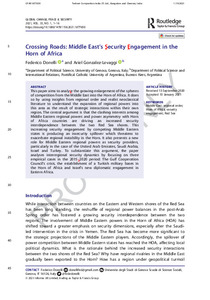Please use this identifier to cite or link to this item:
https://repositorio.uca.edu.ar/handle/123456789/12487| DC Field | Value | Language |
|---|---|---|
| dc.contributor.author | Donelli, Federico | es |
| dc.contributor.author | González Levaggi, Ariel | es |
| dc.coverage.spatial | Oriente Medio | es |
| dc.coverage.spatial | Mar Rojo | es |
| dc.coverage.spatial | Cuerno de Africa | es |
| dc.coverage.spatial | África | es |
| dc.date.accessioned | 2021-10-20T13:21:19Z | - |
| dc.date.available | 2021-10-20T13:21:19Z | - |
| dc.date.issued | 2021 | - |
| dc.identifier.citation | Donelli, F., Gonzalez-Levaggi, A. Crossing Roads: Middle East’s security engagement in the Horn of Africa [en línea]. Postprint del artículo publica en: Global Change, Peace and Security. 2021, 33 (1). doi: https://doi.org/10.1080/14781158.2021.1877650. Disponible en: https://repositorio.uca.edu.ar/handle/123456789/12487 | es |
| dc.identifier.issn | 1478-1158 | - |
| dc.identifier.issn | 1478-1166 (onlíne) | - |
| dc.identifier.uri | https://repositorio.uca.edu.ar/handle/123456789/12487 | - |
| dc.description.abstract | Abstract: This paper aims to analyse se the growing enlargement of the spheres of competition from the Middle East into the Horn of Africa. It does so by using insights from regional order and realist neoclassical literature to understand the expansion of regional powers into this area as the result of strategic interactions within their own region. The central argument is that the clashing interests among Middle Eastern regional powers and power asymmetry with Horn of Africa countries are driving an increased security interdependence between the two Red Sea shores. This increasing security engagement by competing Middle Eastern states is producing an insecurity spillover which threatens to exacerbate regional instability in the Horn. It also presents a new role for Middle Eastern regional powers as security providers, particularly in the case of the United Arab Emirates, Saudi Arabia, Israel and Turkey. To substantiate this argument, the paper analyses interregional security dynamics by focusing on three empirical cases in the 2015¶ –2020 period: The Gulf Cooperation Council’s crisis, the establishment of a Turkish military bases in the Horn of Africa and Israel’s new diplomatic engagement in Eastern Africa. | es |
| dc.format | application/pdf | es |
| dc.language.iso | eng | es |
| dc.publisher | Routledge, Taylor & Francis Group | es |
| dc.rights | Acceso abierto. 18 meses de embargo | * |
| dc.rights.uri | http://creativecommons.org/licenses/by-nc-sa/4.0/ | * |
| dc.source | Global Change, Peace and Security Vol. 33, No.1. 2021 | es |
| dc.subject | POLITICA INTERNACIONAL | es |
| dc.subject | GEOPOLITICA | es |
| dc.subject | RELACIONES INTERNACIONALES | es |
| dc.title | Crossing Roads: Middle East’s security engagement in the Horn of Africa | es |
| dc.type | Artículo | es |
| dc.identifier.doi | https://doi.org/10.1080/14781158.2021.1877650 | - |
| uca.disciplina | CIENCIA POLITICA | es |
| uca.issnrd | 1 | es |
| uca.affiliation | Fil: Donelli, Federico. Universidad de Génova; Italia | es |
| uca.affiliation | Fil: Gonzalez-Levaggi, Ariel. Pontificia Universidad Católica Argentina; Argentina | es |
| uca.version | acceptedVersion | es |
| item.fulltext | With Fulltext | - |
| item.languageiso639-1 | en | - |
| item.grantfulltext | open | - |
| crisitem.author.dept | Facultad de Ciencias Sociales | - |
| crisitem.author.dept | Departamento de Ciencias Políticas y Relaciones Internacionales | - |
| crisitem.author.parentorg | Pontificia Universidad Católica Argentina | - |
| crisitem.author.parentorg | Facultad "Teresa de Ávila" (Paraná) | - |
| Appears in Collections: | Artículos | |
Files in This Item:
| File | Description | Size | Format | |
|---|---|---|---|---|
| crossing-roads-middle-east.pdf | 2,01 MB | Adobe PDF |  View/Open |
Page view(s)
85
checked on Apr 27, 2024
Download(s)
412
checked on Apr 27, 2024
Google ScholarTM
Check
Altmetric
Altmetric
This item is licensed under a Creative Commons License

